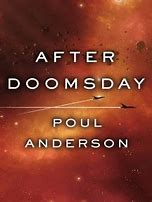"...Donnan had come to know the Kandemirians..." (p. 72)
"[Donnan] saw how the forty men grew taut." (ibid.)
"Donnan could only hope..." (p. 75)
"Donnan heard their rifles fall." (p. 76)
"...Donnan wasn't sure..." (ibid.)
"'A good man,' thought Donnan remotely..." (p. 78)
"[Yule] wasn't sure if Goldberg could hear..." (p. 79)
This is a rare example of a point of view shifting during the course of a passage written by Poul Anderson.
In general, if an author has a good reason to contravene the convention of a single narrative point of view within any single narrative passage, then this reason should be made clear to the reader. Instead, in Dune, Frank Herbert writes as if he is unaware of the convention! Each character knows what he himself is thinking and feeling while interacting with other characters but who can know, and tell us, of disjointed snatches of thought first in one character, then in another? We suppose that the omniscient narrator, being omniscient, can know what every character is thinking but the omniscient narrator should be kept so far in the background that we do not notice that he is there. Instead, we are being made to wonder about his role. I cannot help thinking that this is a major flaw in the text of Dune.

1 comment:
Kaor, Paul!
Here you are raising points I never even thought of, the previous times I read DUNE. Points which deserve to be kept in mind.
Ad astra! Sean
Post a Comment